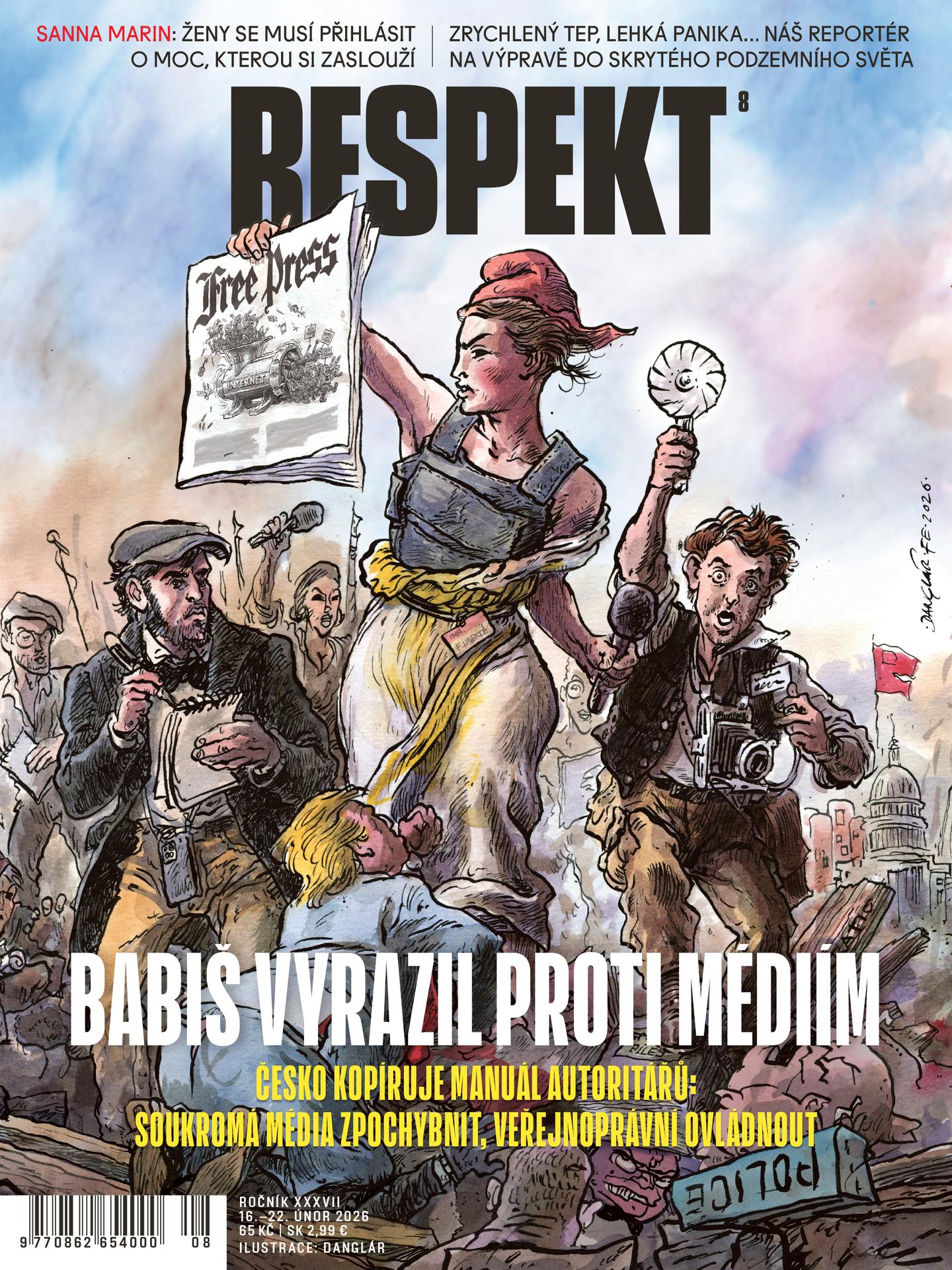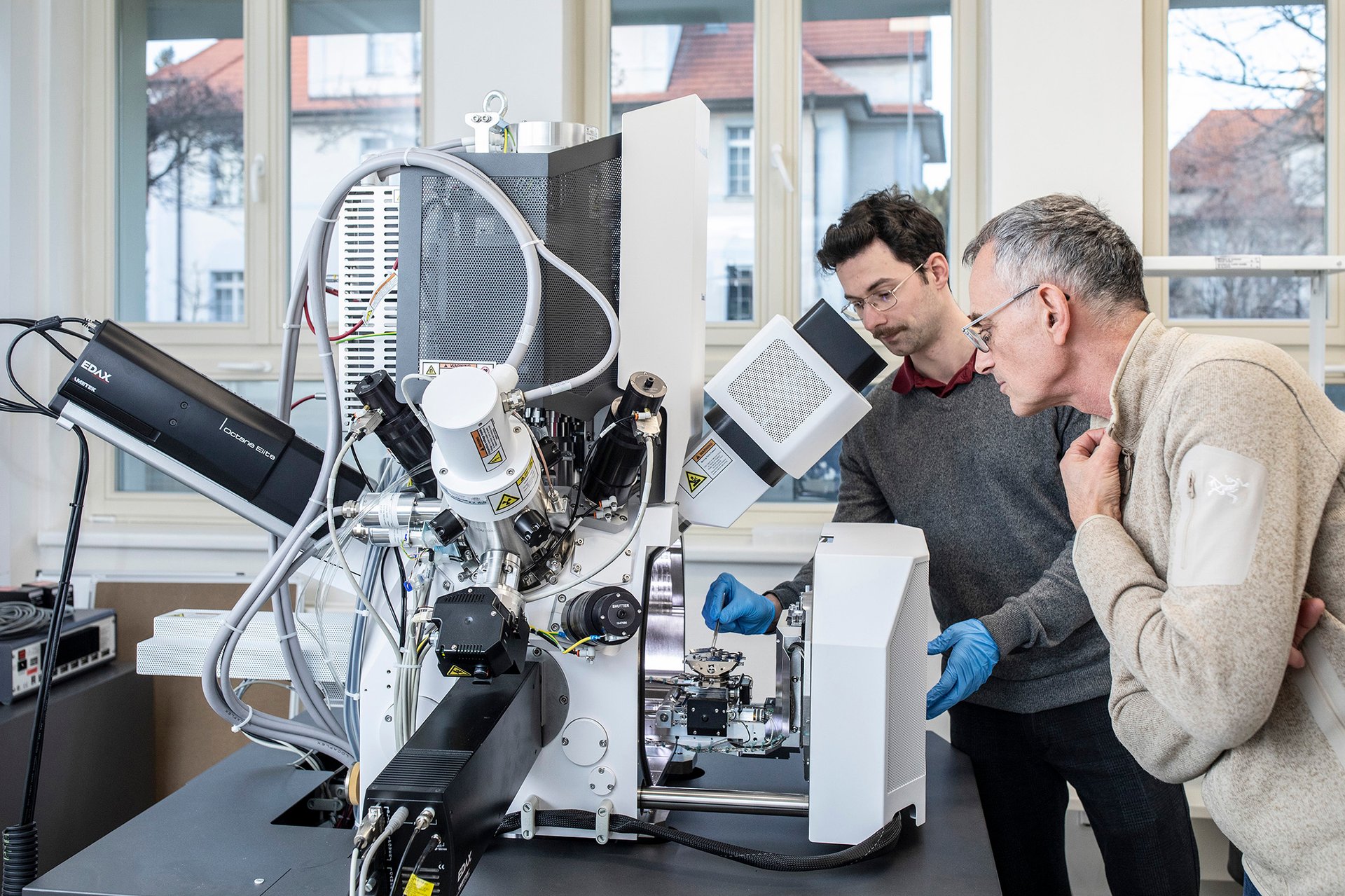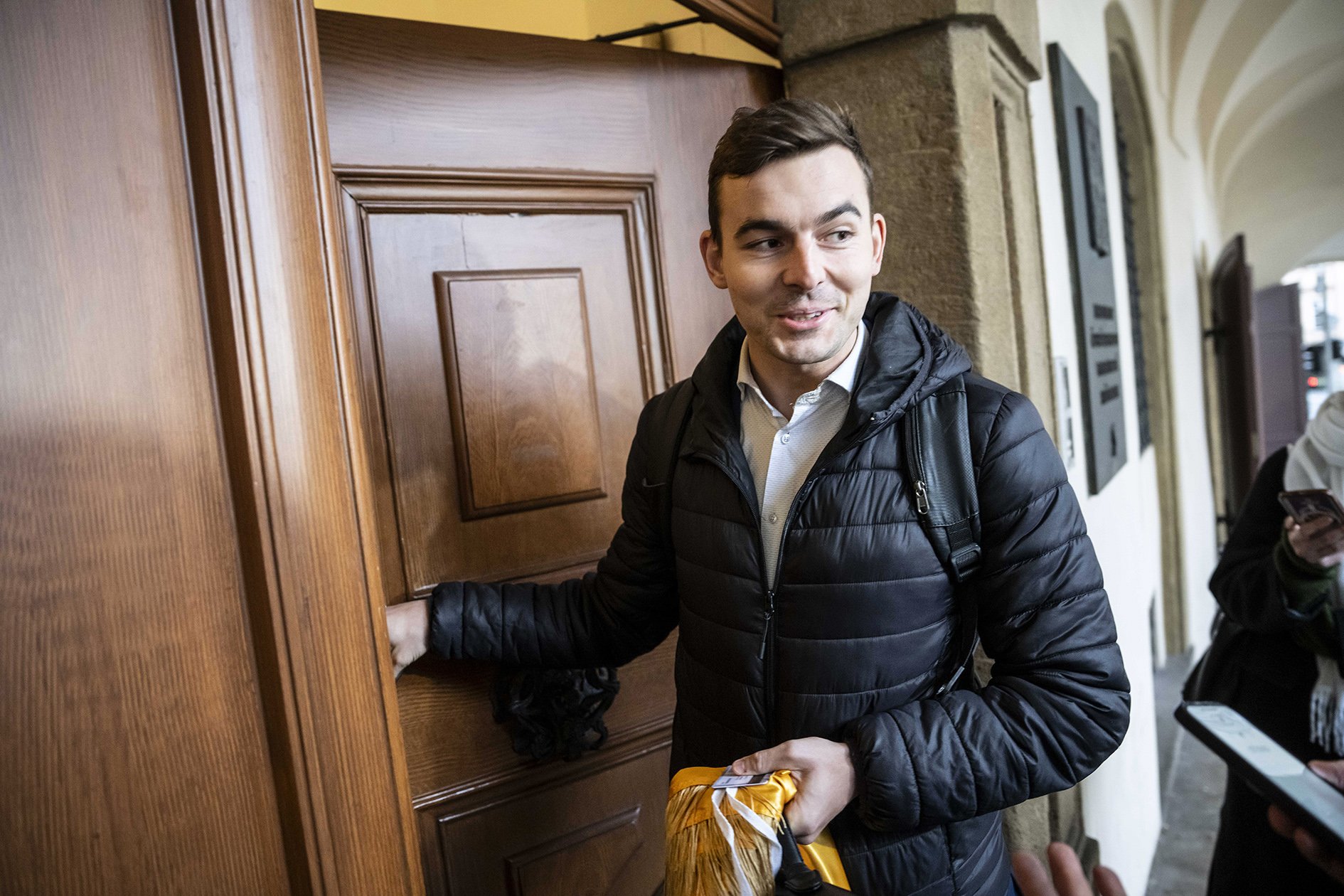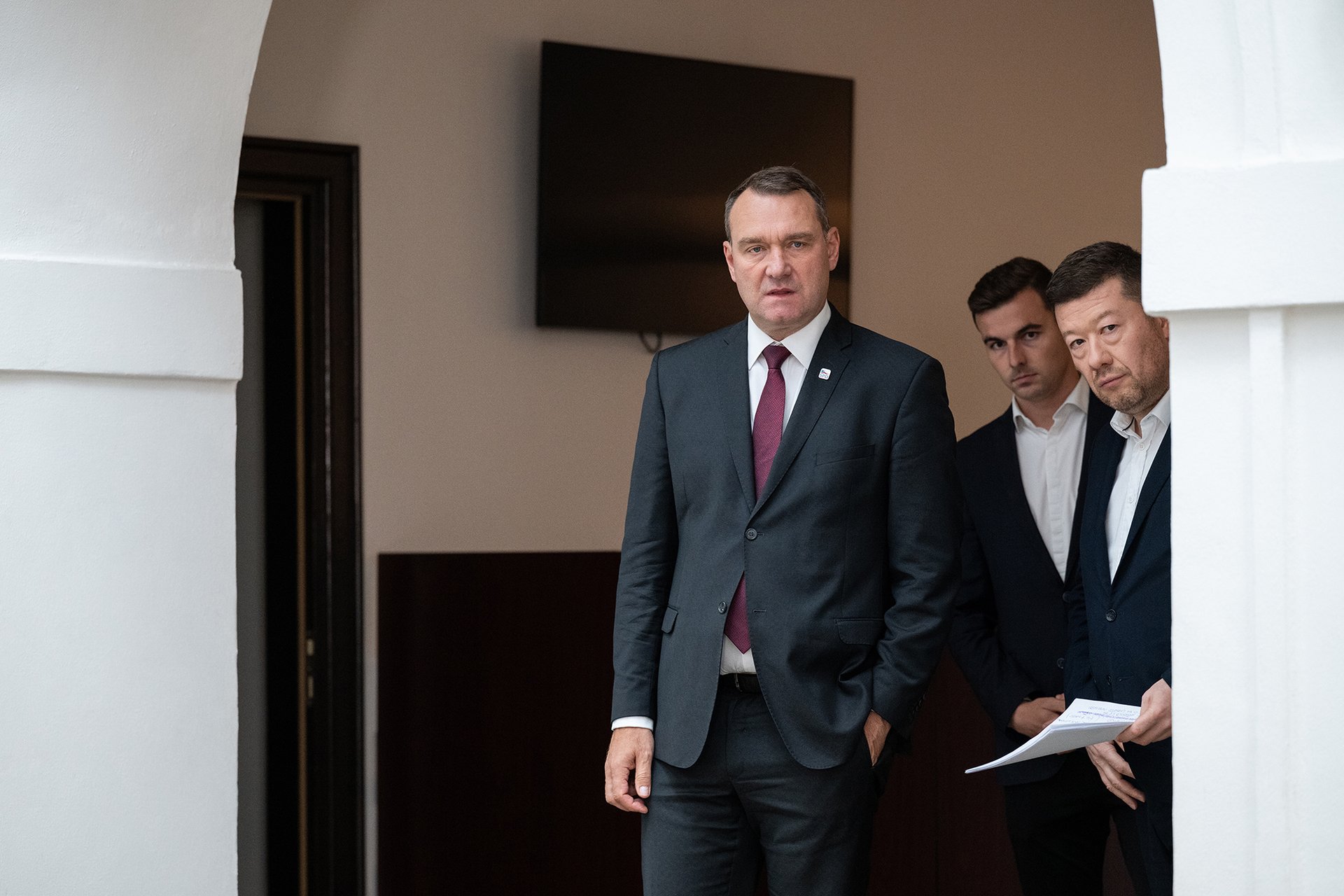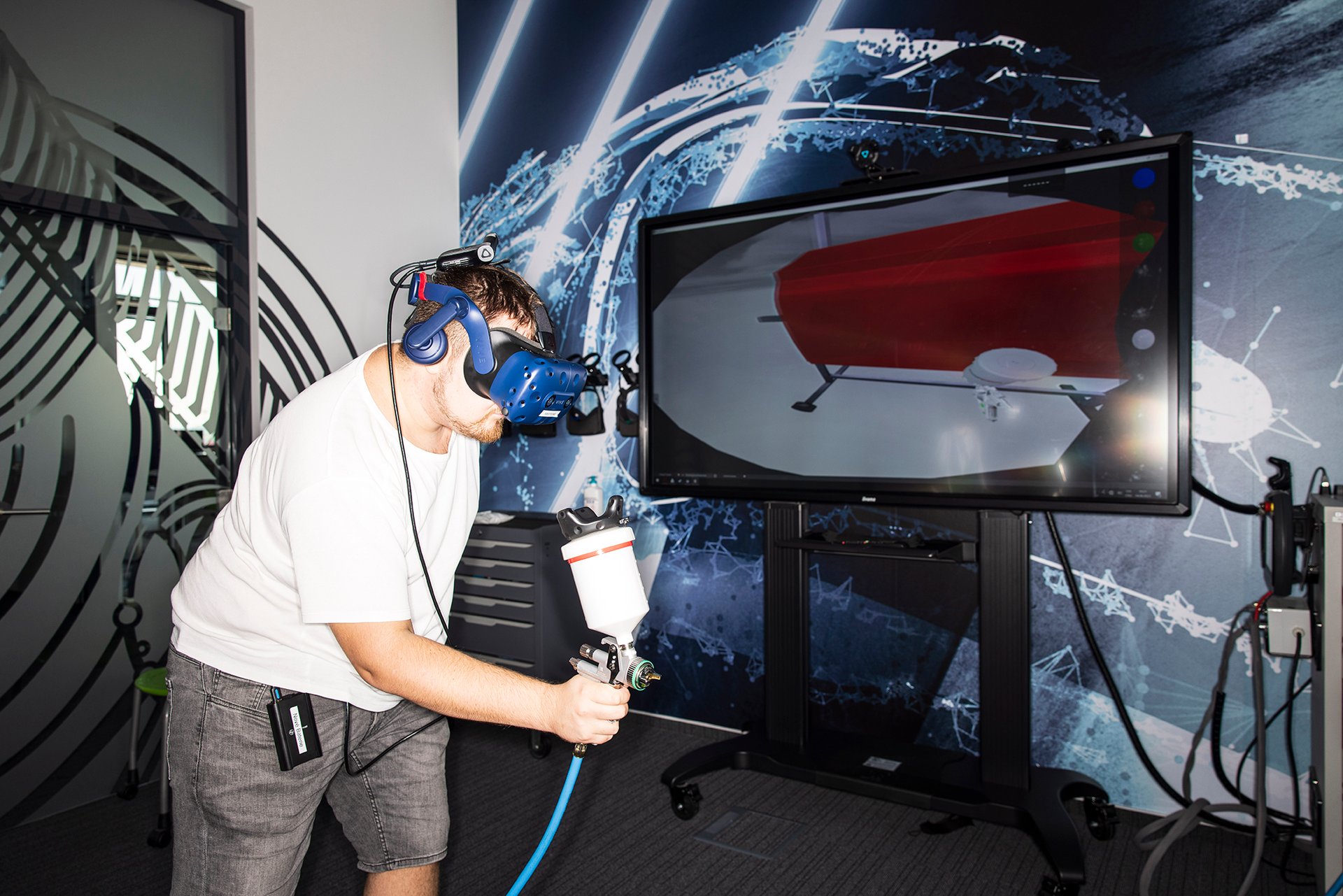Into the Heart of Darkness
Respekt has acquired new evidence of fraud at the Czech Statistical Office concerning a contract worth half a billion koruna



Czechs have a unique opportunity to break the ties of corruption between politics and business that have long drunk their blood and emptied their pockets. The system has received a blow to its very heart – public procurement. The public testimony by businessman Vladimír Kovář about fraud at the Czech Statistical Office in a tender worth half a billion koruna may become the Rubicon for corruption here. What is crucial now is that the case does not vanish into the usual silence and mist. Details newly unearthed are sufficient evidence that the police, politicians and the public should act as swiftly as possible.
Confidential
“You’ve got twenty minutes,” says a man with a short goatee in a pizza restaurant in Prague. And he switches on a dictaphone to record the entire interview with us journalists. Radek Holiš, one of the key figures in the half a billion koruna tender for software for the CSO, appears to be a resourceful and confident man. At least initially. “Who’s your owner? What are your questions aimed at?” his questioner hears. Then he gradually wilts. And when he is asked to describe his role in the opaque tender he becomes nervous. Referring to “confidential information” he deflects questions concerning suspicions over whether and how he helped arrange success for a company that was apparently selected in advance – Hewlett-Packard.
The same city, two kilometres away and three hours later. Vladimír Kovář looks out of his office window at Holešovice in the snow. “I’d do the same again,” says the head of Unicorn, one of the largest Czech software companies and the winner of last year’s Entrepreneur Of The Year award. His company entered the public tender for the CSO and lost, despite offering a price that was 109 million koruna lower. It was Kovář who publicised the initial alarming information on the tender: that he was asked by an intermediary and an anonymous telephone call to pay a bribe of twenty million koruna for a possible first place, and that long before the winner was chosen a man from the government had indicated to him that the contract was tailored to HP.
“Maybe people will now start saying that I’m also involved in corruption and that sooner or later they’ll find out something about me,” says the head of Unicorn. “But I’m not afraid of talk of that kind, and I’m not going to back down because of it. I’m standing by what I said. And I want fraud at the CSO to be properly investigated.”
Today Radek Holiš and Vladimír Kovář – from opposite ends of the spectrum – hold the key to understanding whether (and how and by whom) there was foul play in the CSO contract, worth half a billion koruna, to develop an information system for the census, over which serious suspicions of corruption have been raised over the last month and a half. The indications that the tender was indeed drawn up to suit a single company chosen in advance are becoming stronger and stronger.
Known in advance
The CSO’s acting President Jiří Křovák sits deep in his leather chair. He lets another of the Office’s Vice-Presidents, Stanislav Drápal, answer most of the questions about the suspicious contract; Drápal was directly responsible for the contract as the contracting authority and as a member of the selection committee. They each record our meeting, apparently so that they can verify that they will be “quoted exactly” in the newspapers. Drápal’s answers are monologues lasting several minutes, interspersed with jokes at which he laughs out loud. Jiří Křovák, however, does not laugh. During our two-hour interview he often presses his palms firmly to the table to hide the fact that they are trembling. When he moves his hands away at the end of our meeting, two damp patches remain on the table.
Jiří Křovák first learnt that something was amiss with the contract at the end of August last year, when in a corridor at the Office of the Government Vladimír Mlynář, the chief advisor to the Prime Minister, Jan Fischer (formerly the head of the CSO), gave him an unsigned two-page analysis that stated that the contract for the census had been drafted for Hewlett-Packard. Mlynář had received the document by e-mail from one of his former colleagues at Telefónica O2, where the chief advisor had worked as a consultant before his job with the government.
Respekt has a copy of the document. “It is almost certain that a single bid will be submitted, or that only one bid will satisfy the terms,” it states. “Even if a bid by another bidder reaches the evaluation stage, it will have almost no chance of winning. The winning bidder is known in advance.” The anonymous analyst substantiates that by examining the criteria for the contract to show that the terms had been devised so that “only Hewlett-Packard can satisfy” them in full.
Who exactly sent Mlynář the e-mail is unclear; the chief advisor has not revealed the sender’s identity. However, it is possible to guess why the document was addressed to Mlynář. Telefónica O2, one of the companies interested in the contract, may have expected that its former employee would show the document to his boss, and the pressure exerted by the former President of the CSO, Jan Fischer, on the Office’s new bosses would help make the tender more fair – for instance so that the criteria for the contract would no longer include ones that favoured HP. What is certain is that Vladimír Mlynář gave the document to Jiří Křovák and then had no further involvement in the affair, to avoid the suspicion that he was “promoting his former employer’s interests”.
Once he had received the document Jiří Křovák could have taken decisive action. That would have been logical: the selection of the winner was still a long way off, and he now claims that he was always concerned with the “cleanness of the tender”. In that case Vice-President Křovák had several options half a year ago: to open an internal investigation to see if one of his subordinates had not “tailored” the contract. Or he could have brought in experts from outside the office to conduct that investigation. Or he could have gone straight to the police.
However, the CSO’s acting President did nothing of the sort. He merely convened a meeting of his senior managers, where he pointed to the “necessity” of adhering to the rules for the tender. For the next three months Jiří Křovák did nothing at all about the tender. The turning point came at the beginning of December, when Vladimír Kovář decided to speak publicly and the newspaper Hospodářské noviny alerted to possible fraud in the contract. On the same day the Prime Minister called on Jiří Křovák to investigate the matter and a few hours later the latter did indeed open an investigation. Of the three options described above he chose the first one, an internal audit. And two weeks later the audit concluded that the contract was in order and that no one had rigged it. According to Křovák that proves there were no grounds for suspicion. There is, however, a catch.
Respekt has now found out that Křovák entrusted the audit to the same two people – Vice-President Stanislav Drápal and the head of the project team for the contract, Jaroslav Kraus – who had drawn up the criteria for the contract, and therefore potentially had the greatest opportunity to “tailor” it. “I trust those people a priori,” says Křovák when asked why he entrusted the unravelling of suspicions to his colleagues, who may have had an interest in obscuring the matter as far as possible, rather than to the police. “What is my trust based on? Their experience and their work over many years.”
The exact content of the audit is unclear. Křovák, Drápal and Kraus describe it only in general terms, and it is impossible to ascertain how deeply it went into the suspicions from the “Mlynář letter”, or who they interviewed of the people who had helped them put together the criteria for the CSO contract and what they asked them about. “It’s not easy to verify. We went through those points and thought about whether they might favour someone,” says Drápal, adding that in the end they did not discover anything.
A mystery
However, Křovák and Drápal had another reason, not “just” an anonymous letter, for a more thorough investigation. Fifteen companies received the contract documentation; in addition to Hewlett-Packard, Unicorn and Telefónica O2 they included IBM and Logica – in short the biggest players in the sector on the Czech market. Ultimately, though, other than HP and Unicorn no one else tendered for the contract. That raises the question – all the more interesting in the current financial crisis – of why those experienced players suddenly lost interest in a contract worth half a billion koruna.
“Submitting a tender, which costs roughly one million koruna, could have deterred them,” claims Drápal. Why then did it not deter HP and Unicorn, which are equally large companies? Did he ask them about that? “No, we didn’t talk to any of the companies about that,” he says. The companies themselves also refuse to explain their lack of interest. “We don’t comment on selection procedures that we haven’t won,” says IBM’s spokesperson Vladimíra Pavelková, and other companies take a similar line – including Telefónica, where the “revelatory” analysis originated.
According to Vladimír Kovář, the reason for that “lack of interest” and subsequent silence from the companies is clear. “Information began to appear on the market that Hewlett-Packard was going to get the contract,” Kovář explains. He does not specify the source of such information, saying that it was always relayed through several intermediaries, making it difficult to identify the originator.
While no official statistics are available, recent cases speak clearly: a tender worth two and a half billion koruna to develop the State Treasury, and one to supply vehicles for the Czech Post worth one hundred million koruna, were both won by companies that were the only ones to tender. Contracts are put out to tender, but the criteria are devised so that only one bidder, chosen in advance, has a chance of success. That this is a serious problem has now been admitted by the Minister of Interior, Martin Pecina, who has announced his resolve to change that practice.
This kind of fraud is of course impossible without the active or at least tacit participation of the individual companies. Each one knows that if it remains silent it will sooner or later be awarded another contract. If they were to step out of line they would exclude themselves from the system. “It is inappropriate for us to comment in any way on Mr Kovář’s suspicions or convictions,” says Telefónica’s spokesperson when asked what they think of what Kovář says about the rigging of the contract and whether that was the main reason why they did not tender.
When the system falters
Why then did Kovář tender for the contract? “My involvement in public sector contracts is minimal. I didn’t think it could be rigged in advance,” he explains. According to public procurement experts, that move by the head of Unicorn was unique and owing to his substantially cheaper bid and willingness to speak out the system, which until then had operated smoothly, unexpectedly “faltered”. And that opened up detailed questions. If the tender was tailored to suit HP, people who worked on the contract at the CSO and Hewlett-Packard must have known about it. Or more precisely, HP must have relayed the terms it was able to satisfy to the specialists from the CSO, and someone must have worked in those terms at the CSO.
In contrast with Vice-President Křovák’s spacious office, in Jaroslav Kraus’s office there is barely room to move. The owner of this “broom cupboard”, dressed informally in a blue shirt open at the neck, is the main person at the CSO who decided how the criteria for the controversial tender would be drafted. According to Kraus roughly two-thirds of the CSO’s employees sent him their suggestions. Just like Vice-Presidents Drápal and Křovák, Kraus refuses to specify who and what in particular. “It was teamwork,” Kraus claims. “I’d like to know what you’re getting at,” adds Křovák, raising his voice. And yet it is easy to understand what we are getting at. Who for instance proposed that each bidder should submit documentation on twenty certified IT specialists who would work on the contract, a criterion that was best met by Hewlett-Packard? And how did CSO come up with that figure rather than fifteen or twenty-five? “That’s irrelevant,” counters Kraus.
In Hewlett-Packard Petr Oubrecht, who covers public contracts, was responsible for the tender. Did he communicate with Jaroslav Kraus about the criteria in advance? And what does he think about the information from behind the scenes in IT circles – that he and his colleagues drew up the criteria for the CSO in advance? “Nonsense. I won’t comment on anything to do with the contract,” Oubrecht says into the telephone.
It may seem that even if the contract had been rigged by people from the CSO and HP, there was still a chance to expose and remedy matters. At the CSO the tender was appraised by an evaluation committee with seven members whose main task was to assess whether the contract was put out to tender correctly, and then choose the winner based on clear rules. However, it would be a mistake to rely on the committee, for information on the committee and its work has presented a number of weighty facts that make the suspicion that the tender was tailored to a single bidder almost a certainty.
Trouble on the horizon
Hospodářské noviny has already discovered that the committee did not include any specialists who would have understood the IT technical parameters. And what is new information is that the committee members evidently received an appraisal of the tender before making their choice. Moreover, the committee took no account of the suspicion that Hewlett-Packard had not supplied full documentation in electronic form, as required by the strict terms for the tender: there is evidence that Hewlett-Packard converted the paper documents into electronic form twelve days after the deadline for the tender. If everything had been in accordance with the rules, the winner would not have been allowed to enter the tender. Let us go through those points one by one.
“That’s a substantial problem”, Stanislav Drápal describes how the committee members were selected at the CSO. “Many people rejected me, saying it would result in trouble.” Ultimately he apparently received recommendations for the committee members chosen. From whom? “I don’t have any records about who informed on who,” replies Drápal. It is not about informing, but about half a billion koruna which is being paid by citizens, who should have access to reliable information about who decided on their finances. “I’m not going into that,” says Drápal, ending the debate.
The key question is how did the seven committee members cope with the technical details, which are incomprehensible for laymen? “I can’t tell you anything; I’m bound by confidentiality,” says one member of the committee, Jitka Langhamrová, a demographer from the University of Economics. Another committee member, Zdeněk Kadlec, secretary to the Minister of Education, is a little more informative. “I have experience in IT: I was a member of the General Health Insurance Company’s committee for information technology,” he explains. If anything, though, that is a problem. Last month the media reported that in recent years GHIC has awarded approximately forty contracts worth almost a billion koruna to Hewlett-Packard, without any selection procedures.
“Yes, I did come into contact with those contracts, but I don’t see any problem with that. On the contrary: I was trying to break HP’s monopoly,” Kadlec replies. We do not learn how he broke it, for Kadlec then appeals to confidentiality.
According to its members the committee met roughly five times over the course of four weeks. How in that time did they manage to work through two bids, each with eight hundred pages, and compare and evaluate them? “It’s possible,” says Kadlec, “I devoted three weekends to it.” And maybe he would have managed it, but in reality his work was simplified: the committee members did not have to read the bids at all. Everything points to them having received advance guidelines on how to evaluate the bids. A manual with a hundred and fifty-three pages, in which all the parameters of both bids (several hundred items) are rated with points, was produced by that confident man from our introduction, Radek Holiš, a man who four years ago spent seven months working for Hewlett-Packard and is now employed by Evions, whose owner worked with Hewlett-Packard on the well-known and highly suspicious “Internet for Schools” project, where HP was one of the subcontractors.
“I have a contract with Karel Fischer’s law firm,” says Holiš, who sees nothing strange in his guiding the committee members. “I understand that the evaluation committee can’t read a thick, technical bids, and so it needs someone to process it in some way,” he adds. But how did he get the work? What were his references? In how many similar tenders has he been the expert who predigested bids for committees?
“In terms of public contracts, as far as consultancy is concerned I can’t remember ever doing that,” says Holiš. “I met Karel Fischer a few times and there was some recommendation involved. I gave the materials to him.” He refuses to provide details of his appraisal, referring to the confidentiality clause he signed, and says nothing about which company he recommended as the winner, According to documents in Respekt’s possession it was Hewlett-Packard. “So what if I worked for them in the past? I haven’t been in touch with them for four years,” claims Holiš.
“I won’t say anything about Radek Holiš; I’m bound by confidentiality,” replies Karel Fischer, a lawyer and another of the key figures in the whole tender and, incidentally, also a member of the legal committee at Prague City Hall and a member of the City Hall’s urban planning committee. His law firm provided assistance to the CSO throughout the tender. Vice-President Stanislav Drápal claims he found the company on the internet, where it offered assistance in public tenders.
Among other services Fischer’s law firm does indeed offer consultancy on public tenders. However, a few clicks on the web reveal that it specialises mainly in legal matters concerning apartments, leases and developer projects. We learn nothing of its earlier assistance in tenders from the firm’s website, nor from a number of search engines. Nor does Drápal provide such information when asked. “Which tenders we were involved with so that we were given an opportunity to participate in a tender worth half a billion? Those are trade secrets,” says Fischer.
They are not, but Fischer insists he will reveal nothing more. We can add it all up. For a crucial contract the CSO chose an organiser whose experience is not documented, and it refuses to explain its choice. And the organiser, Karel Fischer, does not want to explain why he chose Radek Holiš, who has no experience with public contracts, and why he organised the delivery of a document to the committee members, on the basis of which the tender was appraised. The CSO cannot explain why the tender was decided by committee members unfamiliar with IT.
And we have left the very best to the end. A requirement for the tender was to supply copies of the written version of the bid in electronic form. A bound and sealed eight-hundred-page bid is difficult to search and read. Committees therefore receive bids in electronic form, which can easily be copied and studied by all of their members. Respekt has documents that confirm that part of the documentation in Hewlett-Packard’s bid was converted into electronic form on 17 October last year – after the deadline for the tender, when any kind of interference with the bids was prohibited. The highly probable explanation is that Hewlett-Packard was so certain of victory that it did not supply its bid in the required format and remedied the matter later, when Vladimír Kovář had complicated the smooth working of the system.
“I can’t tell you anything about that,” says Zdeněk Kadlec, looking at the evidence of copying. “Only that the contracting authority, the CSO, explained it to the committee,” he adds. “I don’t understand claims about adding material after the deadline for the tender,” adds Stanislav Drápal. Karel Fischer has another explanation. “Maybe something was copied; I don’t know why,” he says.
Cancer and what to do about it
The police or the Office for the Protection of Competition can confirm all of the aforementioned indications and indirect evidence of fraud in the tender for software for the CSO. The Anti-Corruption Unit and the OPC are examining the affair, but neither institution is willing to comment before the investigation is completed. In order for us to learn the truth from both institutions it is, however, necessary that politicians publicly back their investigation and clearly state that neither institution will sweep the investigation under the carpet, as has happened in the majority of cases so far.
But politicians have been reticent about the information published on the possible rigging of the CSO contract. Not one of the leaders of the political parties has commented on it in public, although they have made the fight against corruption – especially in public procurement – one of their priorities in the run-up to the election. “I’ve asked the Prime Minister about it,” says Ondřej Liška, the leader of the Green Party. “If the contract was rigged, it should be annulled.” And other politicians? “I don’t know anything about the contract. But there is a way to banish all suspicions. Shine a light onto every spectre and into every dark corner. Publish the progress of tenders on the web. And not only tenders, but also the allocation of subsidies, where billions and billions are involved. I proposed that in the government, but it didn’t get through,” says the Deputy Chairman of TOP 09, Miroslav Kalousek.
The head of the Civic Democrats, Mirek Topolánek, takes a similar view. “I don’t read the newspapers and I don’t know anything about it. If I were to comment on every corrupt contract, I would do nothing else all day. I’m interested in a systemic solution to the causes, and not media accounts of the consequences,” he replies. His counterpart in the Social Democrats is more communicative. “I regard corruption as a cancer in society. The Social Democrats are the sole party to openly criticise the systemic corruption that was a feature of Topolánek’s government. I see the CSO contract as highly suspicious and I don’t have sufficient information on it. I will follow the case and I hope that you, as investigative journalists, or the police will reveal specific breaches of the law. If I were prime minister I would request that the case be examined by the Supreme Audit Office and would ask the CSO’s President for a report on the information published,” writes Jiří Paroubek in a text message.
However, the Prime Minister is Jan Fischer, the CSO’s President on unpaid leave. He should be exceptionally interested in the entire case, and he has the main opportunity to set things in motion. When questioned by journalists the key figures in the tender hide behind the guise of confidentiality, as permitted by law. Incidentally, confidentiality regarding public procurement does not rest on firm ground. Public contracts do not appear on the list of official secrets, nor do trade secrets apply to them. On the contrary, according to lawyers the essence of the existence of the Public Procurement Act is to make them as fair and transparent to the public as possible.
In the public interest Fischer should therefore release the key figures in the tender from confidentiality. “The Prime Minister cannot do that, as he handed over all his powers to his deputy, Jiří Křovák,” claims the Prime Minister’s spokesperson, Roman Prorok.“I’m considering that option,” says Vice-President Jiří Křovák, without giving further details. “However, in the opinion of our lawyer the law does not permit that.” The main trumps are therefore now held by the police and the media, who can continue to exert pressure to clarify all that has been obscured.
Pokud jste v článku našli chybu, napište nám prosím na [email protected].

